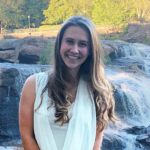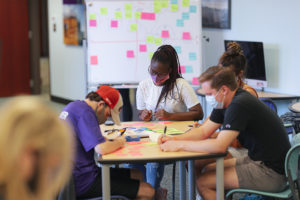IMMERSED IN DISCOVERY
John Quinn, associate professor of biology, visits Greenbrier Farms in Easley, South Carolina,
as part of his research into agriculture and biodiversity evaluated through birdsong analysis.
Quinn’s students have participated in the work and used the data they collected in his research methods class.
That’s the feeling of a student whose study away experience, classroom learning and advising set her on the path to an internship that advances and refines her career plans. That’s the realization of the alumnus whose chosen graduate program resoundingly affirms the trajectory he started at Furman.
For both, it’s a deep sense of belonging. It’s a powerful knowing. It’s finding your people and following your calling – the first, by experiencing and in turn fostering a culture of inclusion at Furman, the second, by following Furman’s guided blend of experiences, mentoring and reflection to a place of purpose.
We have developed The Furman Advantage in much the same way we encourage our students to approach learning and life. Each student has the opportunity to experience transformational learning and mentoring on a pathway to success, so the quality of their education is reflected in the quality of their lives long after they graduate.
Pathways provides advising and mentoring for first- and second-year students in small classes with a single advisor. It eases the transition to college and helps students explore, to learn how to develop their independence, and to start thinking about vocation and what they do best. Instead of thinking only about a degree, they think about the skills that will serve them beyond Furman. In the first years of The Furman Advantage, we developed the pilot for Pathways, which has now reached more than 400 students across four cohorts.
Frequent assessment has been a central piece of The Furman Advantage. Students in the Pathways program report higher satisfaction scores for advising. Early pilot data also suggest that Pathways closes gaps between majority students and students from low-income families, first-generation college students and students of color in
- advising satisfaction,
- belonging,
- participation in engaged learning experiences, and
- earlier and more frequent appointments with career counseling.
For all students, data from the first three years of The Furman Advantage point to a multitude of benefits, including:
- funding support for all students who applied for summer research and internships,
- increased need-based funding for study away,
- increased participation in engaged learning experiences, and
- increased participation in multiple engaged learning experiences.
The results? An environment in which students are more likely to think their education was valuable, to feel more affinity for Furman, and to hold jobs or pursue graduate studies after Furman that they find fulfilling.
We’re strengthening resilience by building a strong foundation of academic, social and coping skills.

“Jordan is a place that I knew absolutely nothing about and would never have considered traveling to. However, through this experience I quickly learned so much about Jordan and virtually still got to do cool things like learn how to cook a traditional dish with a host family.”
JUSTINE EBERHART ’21, virtual international intern for Petra Development & Tourism Regional Authority in Jordan

From left: Tom Petty, Maya Bismark, Julia McCabe and Eli Titherington work on their presentation for Safe Harbor during a MayX course in design thinking
The effects of diet on brain activity. Quilt as autobiography. Artificial intelligence in the stock market. These were just a few of the presentations that more than 650 students shared of their internships, research, service learning, study away, creative projects, first-year writing seminars and capstone experiences during the annual Furman Engaged event. The daylong celebration is sponsored by Furman’s Center for Engaged Learning, which facilitates the high impact, co-curricular opportunities that develop students’ sense of purpose, intellectual curiosity and civic and global engagement, while preparing them for graduate school, professional school or the workforce.
In its 13th year, Furman Engaged was held virtually for the second time, and offered both live and recorded sessions representing experiences from all of Furman’s academic departments, centers and institutes.
Furman Engaged represents the final step of students’ deep learning experiences – the public sharing of their work. Students synthesize what they learned about their disciplines and about themselves, while sharing with their peers and the broader community the experiences that are possible at Furman.
The mission of the Center for Engaged Learning, which includes the offices of internship, research and study away, is to ensure that all students have access to at least one high-impact, immersive, high-quality engaged learning experience.
HAD AT LEAST ONE PROFESSOR AT FURMAN WHO MADE THEM EXCITED ABOUT LEARNING
HAD AN INTERNSHIP OR JOB THAT ALLOWED THEM TO APPLY WHAT THEY WERE LEARNING IN THE CLASSROOM
REPORTED HAVING AN ENGAGEDLEARNING EXPERIENCE AT FURMAN
REPORTED HAVING A STUDY AWAY EXPERIENCE
-Senior Survey results for the Class of 2021
Our nationally recognized program, supported by the Office of Undergraduate Research, the Office of Integrated Research in the Sciences, and academic departments and offices throughout campus, offered students the same breadth and depth of research topics as previous years but in virtual, in-person and hybrid formats. Furman’s undergraduate research program is known for its high success rate in capturing competitive federal grants, national awards for both students and faculty and student/faculty co-authored publications in prominent, peer-reviewed journals. The number of students and faculty who have been doing summer research together has steadily increased since it began in 1966, reaching a new height over the summer of 2021. In total, 272 summer research fellows worked with 104 faculty members – the most in Furman’s history. Student researchers wrote original jazz scores, studied the tectonic development of North America during the Mesoproterozoic era, and examined the causes of death for police officers in the U.S. Some student researchers will be able to submit their research for publication in an academic journal, while others hope to present their research at a professional conference. But all of them, through mentoring and real-world learning, gained insights into their strengths, interests and, in many instances, their next steps after Furman.

“The way I saw students talk about their research, like it meant everything to them, and to have peers cheer them on and support them by listening to their talks … really just showed me how close of a community Furman has.”
CONOR BREADY ’24 on the 13th annual Furman Engaged
The Center for Engaged Learning’s Internship Office made a full rebound this year. The office held more than 600 meetings with 465 unique students, delivering 80 hours of presentations to more than 1,300 students. The office also improved by 4% its outreach over the prior academic year to reach 23% of students from underrepresented groups. And while internships had to be remote during the fall and early spring semesters due to COVID-19, the Internship Office added 75 new internship opportunities with the help of our alumni, parents and other key stakeholders, enabling students to continue interning throughout the academic year. The Summer Fellowship program also recovered and saw a 30% increase in students supported as summer intern fellows with funding and discounted on-campus housing. The program grew from 156 students in 2020 to 226 this summer.
While the pandemic postponed all study-away travel, the program will make a comeback in 2022-23, during which an estimated 185 students will study away for a semester. We anticipate a record number of MayX 2022 study away participants as well. Despite the setbacks of the pandemic, the Rinker Center for Study Away and International Education supported virtual internships and related coursework. Thirteen students participated in a virtual international internship during the spring semester and said they gained valuable cultural insights, better intercultural communication skills and meaningful experiences with collaboration. In addition, the spring faculty-led study-away program, Washington Experience, shifted to a virtual format that included an internship for 11 students.
of History and director of undergraduate research
WHAT’S
POSSIBLE
after Commencement.
OF THE CLASS OF 2020
AMERICAN INSTITUTES FOR RESEARCH AMERICORPS
BLUE CROSS BLUE SHIELD
CAPGEMINI
DELOITTE
EPIC
ERNST & YOUNG
FEDERAL RESERVE BANK
GENERAL MOTORS
GREENVILLE COUNTY SCHOOLS INSIGHT GLOBAL
LIMA ONE CAPITAL
MATHER ECONOMICS
MERCER
MICHELIN
MILLIKEN & COMPANY NORTHWESTERN MUTUAL PRICEWATERHOUSECOOPERS
PRISMA HEALTH
SALESFORCE
SCANSOURCE
STRYKER CORPORATION
UNITED MINISTRIES
U.S. DEPARTMENT OF STATE
U.S. HOUSE OF REPRESENTATIVES
U.S. SENATE
GRADUATE SCHOOLS
BOSTON UNIVERSITY
CLEMSON UNIVERSITY
COLUMBIA UNIVERSITY
CORNELL UNIVERSITY
DUKE UNIVERSITY
FURMAN UNIVERSITY
THE GEORGE WASHINGTON UNIVERSITY GEORGETOWN UNIVERSITY
LONDON SCHOOL OF ECONOMICS MEDICAL UNIVERSITY OF SOUTH CAROLINA NEW YORK UNIVERSITY
NORTH CAROLINA STATE UNIVERSITY PRINCETON UNIVERSITY
UNIVERSITY OF COLORADO
UNIVERSITY OF FLORIDA
UNIVERSITY OF MICHIGAN
UNIVERSITY OF NORTH CAROLINA UNIVERSITY OF SOUTH CAROLINA UNIVERSITY OF TEXAS
UNIVERSITY OF VIRGINIA
VANDERBILT UNIVERSITY
WAKE FOREST UNIVERSITY
OF GRADUATES ARE EMPLOYED, ENROLLED IN GRADUATE SCHOOL OR PARTICIPATING IN SERVICE
CONTINUING EDUCATION 42%
CONTINUING EDUCATION AND EMPLOYED 3%
INTERNSHIP 3%
VOLUNTEER SERVICE/MILITARY 3%